高中英语《语法》复习课件
合集下载
高中英语语法 倒装句语法课件(共63张PPT)
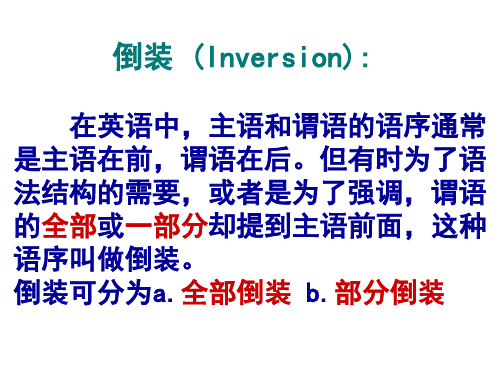
B 3. (2005江苏) ________ about wild plants that they decided to
make a trip to Madagascar for further research.
A. So curions the couple was B. So curious were the couple
open.
A. Try as she might
B. As she might try
C. She might as try
D. Might she as try
33. __D____, the boy knows a lot about computer.
A. Though is he young B. As is he young
3) 介词短语+be+主语 Among the goods are Christmas trees, flowers and toys.
6. 为了保持句子平衡或为了强调表语或状语,为 了使上下文紧密衔接。
a. inside the pyramids are the burial rooms for the s and queens.
如果后一个句子只是单纯的重复前面句子的意 思,则不倒装。
“It is hot today.” “So it is.”
“He finished it on time.” “So he did.”
当前面的句子中主语、谓语或肯否定形式不同时, 则用so it is with….,或it is the same with …句型来表 示。
A are hanging B hanged C hang D hangs
高中英语语法省略句 专题复习课件(共32张PPT)
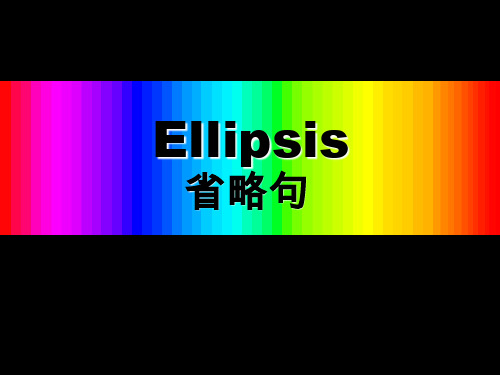
The train is going (at) fifty miles an hour.
This is the most exciting game (that) I have ever watched.
•9、要学生做的事,教职员躬亲共做;要学生学的知识,教职员躬亲共学;要学生守的规则,教职员躬亲共守。2021/9/62021/9/6Monday, September 06, 2021 •10、阅读一切好书如同和过去最杰出的人谈话。2021/9/62021/9/62021/9/69/6/2021 7:52:57 AM •11、只有让学生不把全部时间都用在学习上,而留下许多自由支配的时间,他才能顺利地学习……(这)是教育过程的逻辑。2021/9/62021/9/62021/9/6Sep-216-Sep-21 •12、要记住,你不仅是教课的教师,也是学生的教育者,生活的导师和道德的引路人。2021/9/62021/9/62021/9/6Monday, September 06, 2021
Answer: A
I will是I will get up earlier tomorrow morning的省略说法。
5. —What’s the matter with you?
—I didn’t pass the test, but I
still_______.
A.hope so
B.hope to
13、He who seize the right moment, is the right man.谁把握机遇,谁就心想事成。2021/9/62021/9/62021/9/62021/9/69/6/2021 •14、谁要是自己还没有发展培养和教育好,他就不能发展培养和教育别人。2021年9月6日星期一2021/9/62021/9/62021/9/6 •15、一年之计,莫如树谷;十年之计,莫如树木;终身之计,莫如树人。2021年9月2021/9/62021/9/62021/9/69/6/2021 •16、教学的目的是培养学生自己学习,自己研究,用自己的头脑来想,用自己的眼睛看,用自己的手来做这种精神。2021/9/62021/9/6September 6, 2021 •17、儿童是中心,教育的措施便围绕他们而组织起来。2021/9/62021/9/62021/9/62021/9/6
高中英语语法复习课件--状语从句(48张PPT)
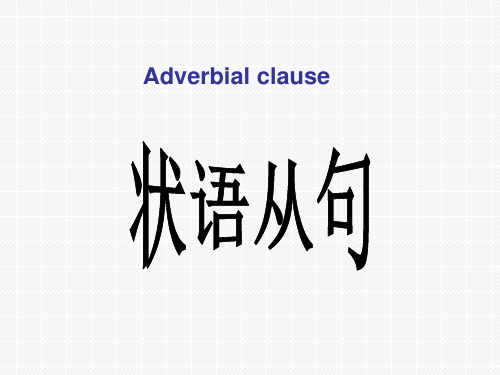
keep it clean.
• * in case(万一) • Send us a message in case you have any
difficulty.
• *on condition that(?) • We’ll let you use the room on condition
that you keep it tidy.
• for 解释说明 • He must be ill, _______.(因为他今天没来)
三 条件状语从句 conditional adverbial clause
if,unless,so/as long as, in case on condition that, provided that,providing that,suppose that, supposing that
if If you work harder,you will succeed.
unless :if... not 除非 • Unless he comes, we won’t be able to go. • If he doesn’t come,we won’t be able to go.
• * as/so long as(只要 ) • You may borrow the book as long as you
2. while“尽管,虽然”,相当于although
3. while意为“而,却”,表示对比。 Jane was dressed in brown while Mary was dressed in blue.
as的用法
1. “一边…一边”; “随着” She was doing her homework as she was listening to the music.
• * in case(万一) • Send us a message in case you have any
difficulty.
• *on condition that(?) • We’ll let you use the room on condition
that you keep it tidy.
• for 解释说明 • He must be ill, _______.(因为他今天没来)
三 条件状语从句 conditional adverbial clause
if,unless,so/as long as, in case on condition that, provided that,providing that,suppose that, supposing that
if If you work harder,you will succeed.
unless :if... not 除非 • Unless he comes, we won’t be able to go. • If he doesn’t come,we won’t be able to go.
• * as/so long as(只要 ) • You may borrow the book as long as you
2. while“尽管,虽然”,相当于although
3. while意为“而,却”,表示对比。 Jane was dressed in brown while Mary was dressed in blue.
as的用法
1. “一边…一边”; “随着” She was doing her homework as she was listening to the music.
新教材北师大版高中英语必修一 Unit 2 Lesson 3 【语法】 课件

3. You should do _s_o_m__et_h_i_n_gin return for your parents. 4. Nobody said ___a_n_y_t_h_inabgout the damage. 5. Why don’t you ask ___s_o_m__e_b_o_d_y__/_s_o_m__eoinntehe neighborhood to help
新教材北师大版高中英语必修一 Unit 2 Lesson 3 【语法】 课件
科 目:英语 适用版本:新教材北师大版 适用范围:【教师教学】
Unit 2 Sports and Fitness
Lesson 3 Running and Fitness
第一页,共十二页。
Language and Grammar
Hello, __ev_e_r_y_o_n_e! I have __s_o_m__e_th__inigmportant to tell you. The new
table tennis room of our school will be open to all teachers and students
you?
6. They offer help to ____________________ interested in golf.
anyone / anybody
第十页,共十二页。
Focus on Grammar: Exercise nobody anyone something anything everyone
take _________ with you. Pleasearneymtheimnbger its open time is 9: 00 am — 5:
新教材北师大版高中英语必修一 Unit 2 Lesson 3 【语法】 课件
科 目:英语 适用版本:新教材北师大版 适用范围:【教师教学】
Unit 2 Sports and Fitness
Lesson 3 Running and Fitness
第一页,共十二页。
Language and Grammar
Hello, __ev_e_r_y_o_n_e! I have __s_o_m__e_th__inigmportant to tell you. The new
table tennis room of our school will be open to all teachers and students
you?
6. They offer help to ____________________ interested in golf.
anyone / anybody
第十页,共十二页。
Focus on Grammar: Exercise nobody anyone something anything everyone
take _________ with you. Pleasearneymtheimnbger its open time is 9: 00 am — 5:
高中英语高考高考英语语法总复习课件:虚拟语气 (共82张PPT)

【例11】 When a pencil is parted in a glass of water, it looks as if it _____(break)_. 【例12】 Eliza remembers everything exactly as if it ______ (happen)yesterday.
主句 would/should/could/might
If he didn’t come tomorrow, we would put off the meeting.
主过将从过, 主过将完从过完 would do/did would have done/had done
【例1】 If we ______ (take)the other road, we might have arrived here in time for the meeting.
【例13】 Look at the terrible situation I am in! If only I ______ (follow)your advice. 知识扩展:follow/take sb's advice
【例13】 Look at the terrible situation I am in! If only I had followed (follow)your advice. 知识扩展:follow/take sb's advice
做题时注意:动词的形式根据它所表示的时间作出相应的调整
一分为二,先找时间再判断时态。
【例4】
If we ______ (book)a table earlier, we couldn’t be standing here in a queue.
高中英语语法大全全课件非常详细(561张PPT)PPT课件

Two teas, please. 请来两杯茶。
d. 抽象名词有时也可数。
four freedoms 四大自由
the four modernizations 四个现代化
many interests 许多兴趣
精选PPT课件
15
精选PPT课件
16
问题1
The ______ is just around the corner and you won’t miss it. (01北京春季)
有些抽象名词和物质名词也可转化为可数名词,用
来表示某种特定的意义。a knowledge of …表示
“对……有所了解“。又如:
This meeting is a great success.
请看下面的可数与不可数名词的转化:Βιβλιοθήκη 精选PPT课件14
a. 当物质名词转化为个体名词时。
Cake is a kind of food. 蛋糕是一种食物。 (U)
A. a four hour C. a four-hours
B. a four hour's
✓D. a four hours'
精选PPT课件
18
问题3: There are only twelve _____ in the hospital.
✓ A.woman doctors B.women doctors
大多数不可数名词都不可能转化为可数名词,常
见的有:information; news; advice; progress;
fun ……如:
This is not a match. We’re playing chess for _____.
✓ A habit B hobby C fun D game (2001上海春季)
高中英语语法汇总课件(共184张PPT)
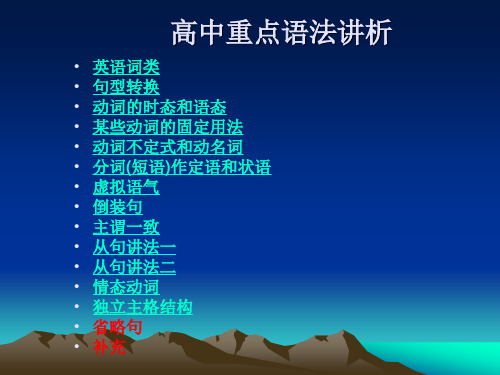
Eg. Either my father or my brothers are coming. Either my brothers or my father is coming. 3.2 there be 的存在句型中,主谓一致采用“就近原则”
Eg. There are desk. There is desk.
Eg. What caused the accident is a complete mestery. 2.6 不定式和动名词做主语,谓语动词用单数.
就近原则
3.1 遇到or, nor, either…or…, neither… nor…, not only… but also…等,谓语动词采用“就近原则”.
My husband, ,more than anyone else in the family, is anxious to go there again.
1.6 主语 + as well as /in addition to /with /along with /together with /execpt, 谓语动词形式随主语本身而定.(考 点:通常主语是单数第三人称, 所以谓语用单数) Eg. The father, as well as his son,is going to travel.
Eg. He is the only one of those boys who is willing to help the little girl.
1.5 主语 + as mush as /rather than /more than /no less than, 谓语动词形式视主语本身单复数而定.(考点:通常该主语是 单数第三人称, 所以谓语用单数) Eg. His brother rather than his parents is to blame.
Eg. There are desk. There is desk.
Eg. What caused the accident is a complete mestery. 2.6 不定式和动名词做主语,谓语动词用单数.
就近原则
3.1 遇到or, nor, either…or…, neither… nor…, not only… but also…等,谓语动词采用“就近原则”.
My husband, ,more than anyone else in the family, is anxious to go there again.
1.6 主语 + as well as /in addition to /with /along with /together with /execpt, 谓语动词形式随主语本身而定.(考 点:通常主语是单数第三人称, 所以谓语用单数) Eg. The father, as well as his son,is going to travel.
Eg. He is the only one of those boys who is willing to help the little girl.
1.5 主语 + as mush as /rather than /more than /no less than, 谓语动词形式视主语本身单复数而定.(考点:通常该主语是 单数第三人称, 所以谓语用单数) Eg. His brother rather than his parents is to blame.
高中英语语法复习:倒装句课件(共48张PPT)
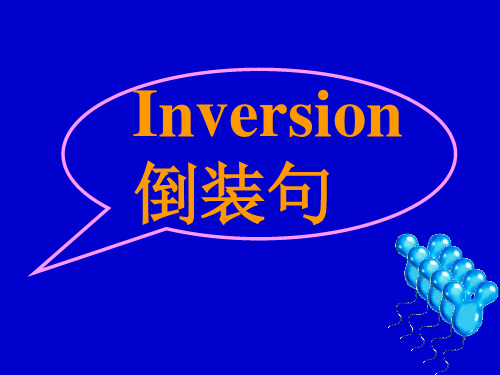
•only by wor harder can we solve the problem.
•I realized that I should have taken your advice only when I lost the game. •Only when I lost the game did I realize that I should have taken your advice.
to his wife. • Nor could his wife.
A strong negative feeling.
• 表示强调。 • 承上启下。 • 平衡结构。 • 增强句子的表现力。 • 制造悬念,渲染气氛。
基本语序
主语 + 谓语
He knew no one in Paris.
倒装语序
An old jacket hangs on the wall. Two lakes lie to the east of the city.
3. 以引导词there开头的句子,须使用倒 装结构,除 there be 外还有there live / stand
THhaorudgahshheewwoorrkkeeddh, ahredf,ahileedfa.iled.
Trhyouagshhehemmigihgth,tTtorym, Tcomuldconuoltdgneot tout goef thoeudtiofffictuhletyd.ifficulty.
Exercises: •I did not begin to do my homework until my mother came back.
Not until (my mother came back) did I begin to do my homework.
•I realized that I should have taken your advice only when I lost the game. •Only when I lost the game did I realize that I should have taken your advice.
to his wife. • Nor could his wife.
A strong negative feeling.
• 表示强调。 • 承上启下。 • 平衡结构。 • 增强句子的表现力。 • 制造悬念,渲染气氛。
基本语序
主语 + 谓语
He knew no one in Paris.
倒装语序
An old jacket hangs on the wall. Two lakes lie to the east of the city.
3. 以引导词there开头的句子,须使用倒 装结构,除 there be 外还有there live / stand
THhaorudgahshheewwoorrkkeeddh, ahredf,ahileedfa.iled.
Trhyouagshhehemmigihgth,tTtorym, Tcomuldconuoltdgneot tout goef thoeudtiofffictuhletyd.ifficulty.
Exercises: •I did not begin to do my homework until my mother came back.
Not until (my mother came back) did I begin to do my homework.
高中英语语法大全PPT课件
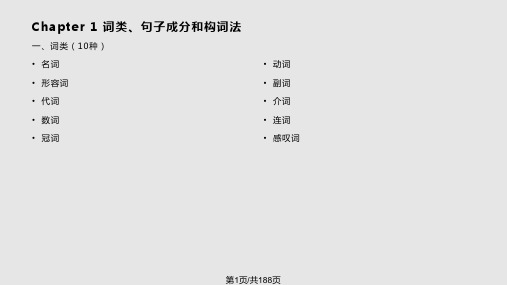
• 名词→动词 hand(手)→(传递),face(脸)→(面对)
• 形容词→副词 early→early, fast→fast
• 副词→连词 when(什么时候)→(当……时候)
• 介词→副词 in(到……里)→(在里面;在家),on(在…上)→(进行,继续),
第6页/共188页
Chapter 2 名词
• 专有名词 Beijing, Tom, the People’s Republic of China • 普通名词
▲可数名词 ▲不可数名词
第7页/共188页
一、英语可数名词的单复数
• 规则变化 ①在单数名词词尾加s ②s,o,x ,sh,ch结尾的词加es ③以辅音字母加y结尾的名词,变y为i,再加es ④以f或fe结尾的名词,变f或fe为v,再加es。
第15页/共188页
主主格格 宾宾格格
第第一一人人 称称单单数数
第第二二人人 称称单单数数
第第三三人人称称单单数数
男男
女女
II
YYoouu hhee
sshhee
((我我))
((你你))
((他他))
((她她))
mmee
yyoouu
hhiimm
hheerr
((我我))
((你你))
((他他))
((她她))
语或者表语,后面千万不可以跟名词 eg. This is your cup,but where is mine?(这是你的杯子,可我的在哪儿?) • 双重所有格:“of + 名词性物主代词”
第18页/共188页
第一人 第二人 称单数 称单数
第三人称单数
男
女
中性
第一人 第二人 第三人 称复 称复数 称复数 数
• 形容词→副词 early→early, fast→fast
• 副词→连词 when(什么时候)→(当……时候)
• 介词→副词 in(到……里)→(在里面;在家),on(在…上)→(进行,继续),
第6页/共188页
Chapter 2 名词
• 专有名词 Beijing, Tom, the People’s Republic of China • 普通名词
▲可数名词 ▲不可数名词
第7页/共188页
一、英语可数名词的单复数
• 规则变化 ①在单数名词词尾加s ②s,o,x ,sh,ch结尾的词加es ③以辅音字母加y结尾的名词,变y为i,再加es ④以f或fe结尾的名词,变f或fe为v,再加es。
第15页/共188页
主主格格 宾宾格格
第第一一人人 称称单单数数
第第二二人人 称称单单数数
第第三三人人称称单单数数
男男
女女
II
YYoouu hhee
sshhee
((我我))
((你你))
((他他))
((她她))
mmee
yyoouu
hhiimm
hheerr
((我我))
((你你))
((他他))
((她她))
语或者表语,后面千万不可以跟名词 eg. This is your cup,but where is mine?(这是你的杯子,可我的在哪儿?) • 双重所有格:“of + 名词性物主代词”
第18页/共188页
第一人 第二人 称单数 称单数
第三人称单数
男
女
中性
第一人 第二人 第三人 称复 称复数 称复数 数
人教高中英语语法综合复习全解动词I讲课文档

Conclusion about auxiliary verbs:
助动词协助主要动词完成以下功用:
(1)表示时态 He is singing.
(2)表示语态 He was sent to England. (3)构成疑问句 Do you like college life?
(4)与否定词not合用,构成否定句。
B. serve for
C. serve to
D. serve on
容易误选B,即字对字地翻译汉语的“全心
全意为人民服务”, 将其中的“为”译为
for。
第二十一页,共57页。
考点梳理3:
及物动词,不及物动词
及物动词(vt.)后必须跟有动作的对象(即宾 语),并且可直接跟宾语。 不及物动词(vi.)后面不可直接接宾语,一般 要加介词后再接宾语。
marry 可用作及物动词或不及物动词,用作及 物动词时它的意思“与某人结婚”,而不仅仅
是“结婚”,也就是说,后接宾语时,无需用 介词to,with等,即marry sb。
3. How can I _____ you, Mr.Green?
A. contact
B. contact with
C. contact to
He reached Paris the day before yesterday.
He lives in London.
第二十二页,共57页。
举一反三
1. I ______ you yesterday, but you weren’t in.
A. rang
B. rang to
C. rang with
人教高中英语语法综合复习全解课件动词IPPT
第一页,共57页。
高考英语语法总复习4人称代词物主代词反身代词课件

高中英语 语法总复习 代词Ⅰ
代词考点
人称代词 物主代词 反身代词 指示代词 疑问代词 不定代词
指代名词或一句话的词类
代词
(1)人称代词的分类
1.人称代词 (2)人称代词的用法
(3)人称代词的排列顺序
(1)人称代词的分类
数 人称
格 第一人称 第二人称 第三人称
主格
单数
宾格
I
me
you
you
he,she,it
C.me; one
D.me, it
(1)反身代词的分类
3.反身代词 (2)反身代词的用法
(3)反身代词固定搭配
(1)反身代词的分类
人称 数
单数
复数
第一人称
myself ourselves
第二人称
yourself yourselves
第三人称
himself,herself,itself themselves
让我迎接挑战,我会欣然面对它。
2.人称代词单独使用或在没有谓语动词的句子中时通常用宾格
Why me?I’ve been working for two weeks on end.
为什么是我?我已经连续上了两周的班了。
-Glad to see you. -Me too.
很高兴见到你。 我也是。
(3)人称代词的排列顺序
him,her,it
复数
主格
宾格
we
us
you
you
they
them
(2)人称代词的用法
1.人称代词作主语时,用主格;作动词或介词宾语时,用宾 格;作表语时,用主格,但在口语中常用宾格
Give me(宾语) a challenge,and I(主语) will meet it(宾语) with joy.
代词考点
人称代词 物主代词 反身代词 指示代词 疑问代词 不定代词
指代名词或一句话的词类
代词
(1)人称代词的分类
1.人称代词 (2)人称代词的用法
(3)人称代词的排列顺序
(1)人称代词的分类
数 人称
格 第一人称 第二人称 第三人称
主格
单数
宾格
I
me
you
you
he,she,it
C.me; one
D.me, it
(1)反身代词的分类
3.反身代词 (2)反身代词的用法
(3)反身代词固定搭配
(1)反身代词的分类
人称 数
单数
复数
第一人称
myself ourselves
第二人称
yourself yourselves
第三人称
himself,herself,itself themselves
让我迎接挑战,我会欣然面对它。
2.人称代词单独使用或在没有谓语动词的句子中时通常用宾格
Why me?I’ve been working for two weeks on end.
为什么是我?我已经连续上了两周的班了。
-Glad to see you. -Me too.
很高兴见到你。 我也是。
(3)人称代词的排列顺序
him,her,it
复数
主格
宾格
we
us
you
you
they
them
(2)人称代词的用法
1.人称代词作主语时,用主格;作动词或介词宾语时,用宾 格;作表语时,用主格,但在口语中常用宾格
Give me(宾语) a challenge,and I(主语) will meet it(宾语) with joy.
高中英语语法复习——非谓语动词在语法填空中应用 优质课件(33张PPT)
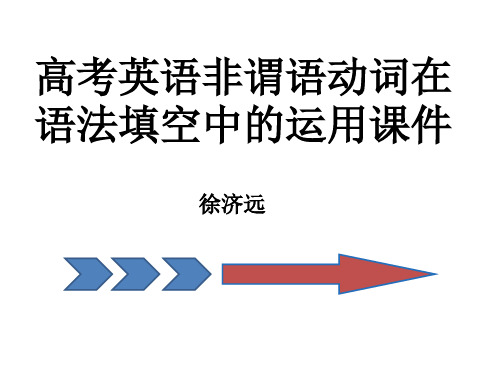
如果动作正在进行,则用-ing的被动形式。
原主则句五 主原:语则非 保谓 持五语 一:动 致非词 。谓作语状动语词时,作原状则语上时其,逻…辑主语应与 原原则则六:六强:调强动调作动发作生发在生主句在谓主语句动谓作语之动前作,原则上 要用完成式(-ing之的前完时成,式或…不定式的完成式)
原则七:用于名词后作定语,原则是:不定式表示动作
__m__a________ (make) it the most popular sport
in the world.
分词表示结果包含着一种必然发生的结果。
• 非谓语动词考点语篇填空综合应用
Exercise 1
• We are ____1___ (interest) in the story about Sn ow White because it is a very _______2_______ ( interest) story. Once upon a time, there was a pri ncess __3___ (name) Snow White. She was the m ost beautiful girl in the world but she had a step mother who treated her very badly. She even ord ered a guard to kill her. The guard didn’t kill Sno w White. Instead, he asked Snow White to escape at once. ___4___ (terrify) by some strange sound s, she ran quickly through the forest and came to a wooden house
原主则句五 主原:语则非 保谓 持五语 一:动 致非词 。谓作语状动语词时,作原状则语上时其,逻…辑主语应与 原原则则六:六强:调强动调作动发作生发在生主句在谓主语句动谓作语之动前作,原则上 要用完成式(-ing之的前完时成,式或…不定式的完成式)
原则七:用于名词后作定语,原则是:不定式表示动作
__m__a________ (make) it the most popular sport
in the world.
分词表示结果包含着一种必然发生的结果。
• 非谓语动词考点语篇填空综合应用
Exercise 1
• We are ____1___ (interest) in the story about Sn ow White because it is a very _______2_______ ( interest) story. Once upon a time, there was a pri ncess __3___ (name) Snow White. She was the m ost beautiful girl in the world but she had a step mother who treated her very badly. She even ord ered a guard to kill her. The guard didn’t kill Sno w White. Instead, he asked Snow White to escape at once. ___4___ (terrify) by some strange sound s, she ran quickly through the forest and came to a wooden house
高考英语一轮复习英语语法专题复习:状语从句讲解课件(共59张)
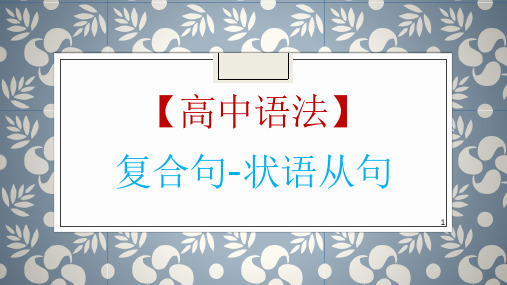
13
时间状语从句
时间状语从句:用于说明主句动作或状态发生、存在的时间。 (3) 若主句是将来时,从句要用一般现在时。(主将从现) By the time you _______(come) back, I had finished this book. By the time you ________(come) here tomorrow, I will have finished this work. It will be four days before they ________(come) back.
7
真题解析
【2017阅读】 When, like me, you're over 40 and you believe the music industry has been in decline since in 1993 (the year Nirvana released in Utero), it's easy to criticize the music taste of “the kids these days,” a term even the 23-year old Swift uses.
14
时间状语从句
时间状语从句:用于说明主句动作或状态发生、存在的时间。 (3) 若主句是将来时,从句要用一般现在时。(主将从现)
15
02 地点状语从句
16
地点状语从句
地点状语从句:用于表达主句动作发生的场所。 (1) 常用引导词:where
Make a mark where you have questions. Where there is love, there is hope. (2) 特殊引导词:wherever Wherever the sea is , you will find sailors.
时间状语从句
时间状语从句:用于说明主句动作或状态发生、存在的时间。 (3) 若主句是将来时,从句要用一般现在时。(主将从现) By the time you _______(come) back, I had finished this book. By the time you ________(come) here tomorrow, I will have finished this work. It will be four days before they ________(come) back.
7
真题解析
【2017阅读】 When, like me, you're over 40 and you believe the music industry has been in decline since in 1993 (the year Nirvana released in Utero), it's easy to criticize the music taste of “the kids these days,” a term even the 23-year old Swift uses.
14
时间状语从句
时间状语从句:用于说明主句动作或状态发生、存在的时间。 (3) 若主句是将来时,从句要用一般现在时。(主将从现)
15
02 地点状语从句
16
地点状语从句
地点状语从句:用于表达主句动作发生的场所。 (1) 常用引导词:where
Make a mark where you have questions. Where there is love, there is hope. (2) 特殊引导词:wherever Wherever the sea is , you will find sailors.
高中英语语法复习课件--短文改错技巧(共42张PPT)

解题策略
(1) 明确句中动词所作的句子成分. (2) 前后联系,整体把握 . 系统掌握非谓语动词 的句法功能.
Note: (1) 谓语动词与非谓语动词的混用. (2) 非谓语动词之间的混用. (3) 在并列结构中谓语与非谓语动词的误用.
practice
1)My parents will do all they can make sure that I
hill.
3. When a young man starts to earn his own living, he can no longer expect others to pay his food .
for
4. The gentleman insisted at my receiving the
get a good education.
to
2)We fed monkeys, visiting temples and told
stories.
visited
3) Soon I began to enjoy talk to myself on paper as
I was learning to express mystealflkiinngsimple English.
解题策略
(1) 理清短文中代词的指代关系,注意 联系上下文。
(2) 系统掌握it的各种用法 .
practice
• Some students may also save up for our
college or future use .
their
2. I was learning to express me in simple
高考链接6: There was one on particular I’d really wanted.(2011 浙江卷)
语法知识点总复习课件-2022-2023学年高中英语外研版(2019)必修第一册

二、派生:后缀
2.后缀
(2)副词后缀。
(1)形容词后缀。 ①名词+-al
形容词+-ly
agriculture农业→agricultural 农业的 ②名词+-ful
certain 确定,肯定→certainly 确定;肯定
care 小心;关心→careful 小心的;仔细的
happy 快乐的→happily快乐地
二、派生:1. 前缀
1. 前缀 (1)表示否定意义的前缀。 un-不,非 unable不能够的 unlucky 不幸的 dis-不,非 dishonest 不诚实的 discontinuous 不连续的 in-不,非 inactive 不活跃的 incorrect 不正确的 im-不,非 impatient 不耐烦的 impossible 不可能的 ir-不,非 irregular 不规则的 irresponsible 不负责任的 il-不,非 illogical 不合逻辑的 illegal 非法的 non-不,非 non-existent 不存在的 non-stop 直达的;连续不断的 mis-错误 mislead 误导 misunderstand 误解
一、合成 温馨提示: ①与man或woman构成的合成名词变复数时,两个名词都要变成复数。 a woman teacher →women teachers a man doctor→men doctors ②由“名词+名词”构成的复合名词,在变复数时,只改变中心名词,而修饰名 词不变。 a girlfriend→girlfriends a babysitter→babysitters
3.合成形容词
温馨提示: 成形容词一般要有连字符,其中的名词部分不用复数形式。 a 2,000-word report 一份两千字的报道 an 800-metre-long bridge 一座八百米长的桥
相关主题
- 1、下载文档前请自行甄别文档内容的完整性,平台不提供额外的编辑、内容补充、找答案等附加服务。
- 2、"仅部分预览"的文档,不可在线预览部分如存在完整性等问题,可反馈申请退款(可完整预览的文档不适用该条件!)。
- 3、如文档侵犯您的权益,请联系客服反馈,我们会尽快为您处理(人工客服工作时间:9:00-18:30)。
He is writing a novel. (3)表示按计划安排即将发生的动作(如go,come,leave,arrive等)
The train is leaving in 15 minutes. (4)现在进行时常与副词always, constantly(经常地,不断地),forever等连用表 示反复出现或习惯性动作,含有责备,批评,不满,厌恶,遗憾等情感。
It is the first time that I have come to Beijing. 2.it/this/that is(was)the+形容词最高级sth+(that)sb has/have done .
This is the most exciting movie that I have seen. 3.It has been+时长+sb did sth
Here comes the teacher. (6)图片,电影的说明,解说;戏剧的内容等。
一般过去时 标志词:yesterday/last week/the other day不久前的一天 /…ago…以前/in1980/just now… (1)表示过去经常,反复发生的动作或存在的状态。
When I was a child, I often went to that park. (2)表示过去发生的短暂的动作。 The murderer(凶手,杀人犯)died in a car accident. (3)在时间,条件状语从句中用一般过去时代替过去将来 时。
She is the most beautiful
注意:within five minutes 五分钟之内 in five minutes用于一般将来时多翻译成五分钟之后,用于过去时可翻译
成五分钟之内。
现在进行时 构成:(am/is/are+v-ing) (1)表示此时此刻正在进行或发生的动作(标志词:look, now,at the moment此 刻现在)
We had planned for 20 guests but only 10 arrived.
将来完成时
shall/will+have done 1.表示动作或状态延续到将来的某一时间。 We shall have walked a long way before we reach the village. 2.表示动作或状态在将来某一时间之前已经结束,但其影响却延续 到那一时间。
时态: 一般现在时: (1)表示经常,反复发生的动作或存在的状态。 We often go to school.
She is a teacher. (2)表示客观事实或普遍真理。 The sun rises in the east.
Three plus two is five. (3)arrive,be,begin,go,leave,return,come,start等表示按计划发生的动作或状态。 My train leaves at 6:00. (4)在时间或条件状语从句中用一般现在时代替一般将来时(if,when,in case假使 ,万一, before,after, until, unless, as soon as…) I will let you know as soon as I hear from you. (5)here, there开头的一般现在时表示正在发生的动作。 There goes the bell.
It has been seven years since I last saw him.
1.He has died for five years.(错误) He has been dead for five years.(正确)
2.I have bought the house for three years.(错误) I have had the house for three years.(正确)
You are always finding faults with me. (5)表示过程
It is getting hot.
过去进行时 构成:was/were+v-ing 1.过去某时刻正在做的事情。
What was she doing at nine o’clock yesterday? 2.过去某阶段正在做的事。
过去完成进行时 构成:had+been+doing 表示从过去某一时间开始一直延续到过去的另一时间还在进行的动作。 When he came in, we had been talking for an hour.
冠词:
1.不定冠词 :a an
This is a book.
This is an elephant.
He has lived here sine he was born.
I have been ill for two weeks. 注意:此时需要用持续性/延续性动词,如:
saty,keep,know,work,sleep,study,lie,rain… 2.表示过去发生的对现在有影响的动作 I have lost my key(我进不了门) The elevator has broken down.(我们可能得爬楼梯…) 固定句型: 1.It/this/that is(was) the +序数词time(that)sb+have/has done sth
将来完成进行时 构成:shall/will+have been doing 表示动作从过去某一时间开始,持续到将来的某一时刻,很可能还会持续下去 I shall have been working here in this factory for twenty years by the end of the year. 到今年年底,我将在这个工厂工作20年了。
She was studying in Beijing University at that time. 3.过去进行时表将来(come/go/arrive/leave/start/begin/return等)
We were excited because we were flying to Paris the next
He said when she came he would tell her.
一般将来时 (1)表示将来某一时刻的动作或状态,或将来某一时间内经常的动作或状态。 I will go to school tomorrow. Shall we go to the park? 注意:shall用于第一人称,will都可以。 (2)be going to+动词原形 多用于口语,表示打算,计划,准备即将做某事。 They are going to Australia. (3)be to do sth(安排好的事,按规则,惯例;或表命令要求) Trump(特朗普)is to take office (就职,上任)tomorrow. You are not to smoke in the office. (4)be about to do sth马上很快就要发生的事(不和具体的时间状语搭配) Hurry up! The movie is about to begin. The train is about to leave .(正确) The train is about to leave in five minutes/at 9:00.(错误) I was about to fall asleep when the teacher called my name. (be about to do…when… 正要做…这时…)
I shall have finished my homework by ten o’clock.
现在完成进行时 构成:have/has+been+doing (1)表示动作从过去一直持续到现在,有可能继续持续下去。 Where have you been living these years? They have been working for two hours. (2)表示不久前刚结束的动作。 Sorry, I’m late. How long have you been waiting for me ?
(4)指一类人(the young/the poor/the old……)
The rich live a happy life.
(5)表示一家人
The Greens are kinhe violin(小提琴)/piano
(7)形容词最高级前面要用the(副词最高级前面的the可省略)
morning. 4.表达一种情绪。 He was always ringing me up(厌烦) 5.客气委婉地表达自己的想法。 I was hoping you could reconsider(重新考虑) my suggestion.
将来进行时 构成:shall/will be doing (1)表将来某一时刻或某一段时间正在进行的动作。 I will be writing an article. When you get to the station at nine tomorrow, your uncle will be waiting for you there. (2)表示按计划将要发生的动作 They will be having their holiday in August. I hope you will be coming on time.
2.定冠词:the
(1)指双方都明白的事物。
Take the medicine three times a day.
(2)指上文提到过的人或事。
He bought a house. I have been to the house.
The train is leaving in 15 minutes. (4)现在进行时常与副词always, constantly(经常地,不断地),forever等连用表 示反复出现或习惯性动作,含有责备,批评,不满,厌恶,遗憾等情感。
It is the first time that I have come to Beijing. 2.it/this/that is(was)the+形容词最高级sth+(that)sb has/have done .
This is the most exciting movie that I have seen. 3.It has been+时长+sb did sth
Here comes the teacher. (6)图片,电影的说明,解说;戏剧的内容等。
一般过去时 标志词:yesterday/last week/the other day不久前的一天 /…ago…以前/in1980/just now… (1)表示过去经常,反复发生的动作或存在的状态。
When I was a child, I often went to that park. (2)表示过去发生的短暂的动作。 The murderer(凶手,杀人犯)died in a car accident. (3)在时间,条件状语从句中用一般过去时代替过去将来 时。
She is the most beautiful
注意:within five minutes 五分钟之内 in five minutes用于一般将来时多翻译成五分钟之后,用于过去时可翻译
成五分钟之内。
现在进行时 构成:(am/is/are+v-ing) (1)表示此时此刻正在进行或发生的动作(标志词:look, now,at the moment此 刻现在)
We had planned for 20 guests but only 10 arrived.
将来完成时
shall/will+have done 1.表示动作或状态延续到将来的某一时间。 We shall have walked a long way before we reach the village. 2.表示动作或状态在将来某一时间之前已经结束,但其影响却延续 到那一时间。
时态: 一般现在时: (1)表示经常,反复发生的动作或存在的状态。 We often go to school.
She is a teacher. (2)表示客观事实或普遍真理。 The sun rises in the east.
Three plus two is five. (3)arrive,be,begin,go,leave,return,come,start等表示按计划发生的动作或状态。 My train leaves at 6:00. (4)在时间或条件状语从句中用一般现在时代替一般将来时(if,when,in case假使 ,万一, before,after, until, unless, as soon as…) I will let you know as soon as I hear from you. (5)here, there开头的一般现在时表示正在发生的动作。 There goes the bell.
It has been seven years since I last saw him.
1.He has died for five years.(错误) He has been dead for five years.(正确)
2.I have bought the house for three years.(错误) I have had the house for three years.(正确)
You are always finding faults with me. (5)表示过程
It is getting hot.
过去进行时 构成:was/were+v-ing 1.过去某时刻正在做的事情。
What was she doing at nine o’clock yesterday? 2.过去某阶段正在做的事。
过去完成进行时 构成:had+been+doing 表示从过去某一时间开始一直延续到过去的另一时间还在进行的动作。 When he came in, we had been talking for an hour.
冠词:
1.不定冠词 :a an
This is a book.
This is an elephant.
He has lived here sine he was born.
I have been ill for two weeks. 注意:此时需要用持续性/延续性动词,如:
saty,keep,know,work,sleep,study,lie,rain… 2.表示过去发生的对现在有影响的动作 I have lost my key(我进不了门) The elevator has broken down.(我们可能得爬楼梯…) 固定句型: 1.It/this/that is(was) the +序数词time(that)sb+have/has done sth
将来完成进行时 构成:shall/will+have been doing 表示动作从过去某一时间开始,持续到将来的某一时刻,很可能还会持续下去 I shall have been working here in this factory for twenty years by the end of the year. 到今年年底,我将在这个工厂工作20年了。
She was studying in Beijing University at that time. 3.过去进行时表将来(come/go/arrive/leave/start/begin/return等)
We were excited because we were flying to Paris the next
He said when she came he would tell her.
一般将来时 (1)表示将来某一时刻的动作或状态,或将来某一时间内经常的动作或状态。 I will go to school tomorrow. Shall we go to the park? 注意:shall用于第一人称,will都可以。 (2)be going to+动词原形 多用于口语,表示打算,计划,准备即将做某事。 They are going to Australia. (3)be to do sth(安排好的事,按规则,惯例;或表命令要求) Trump(特朗普)is to take office (就职,上任)tomorrow. You are not to smoke in the office. (4)be about to do sth马上很快就要发生的事(不和具体的时间状语搭配) Hurry up! The movie is about to begin. The train is about to leave .(正确) The train is about to leave in five minutes/at 9:00.(错误) I was about to fall asleep when the teacher called my name. (be about to do…when… 正要做…这时…)
I shall have finished my homework by ten o’clock.
现在完成进行时 构成:have/has+been+doing (1)表示动作从过去一直持续到现在,有可能继续持续下去。 Where have you been living these years? They have been working for two hours. (2)表示不久前刚结束的动作。 Sorry, I’m late. How long have you been waiting for me ?
(4)指一类人(the young/the poor/the old……)
The rich live a happy life.
(5)表示一家人
The Greens are kinhe violin(小提琴)/piano
(7)形容词最高级前面要用the(副词最高级前面的the可省略)
morning. 4.表达一种情绪。 He was always ringing me up(厌烦) 5.客气委婉地表达自己的想法。 I was hoping you could reconsider(重新考虑) my suggestion.
将来进行时 构成:shall/will be doing (1)表将来某一时刻或某一段时间正在进行的动作。 I will be writing an article. When you get to the station at nine tomorrow, your uncle will be waiting for you there. (2)表示按计划将要发生的动作 They will be having their holiday in August. I hope you will be coming on time.
2.定冠词:the
(1)指双方都明白的事物。
Take the medicine three times a day.
(2)指上文提到过的人或事。
He bought a house. I have been to the house.
